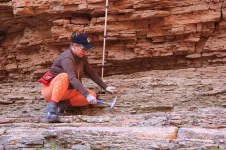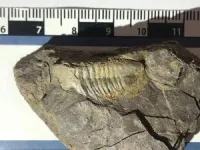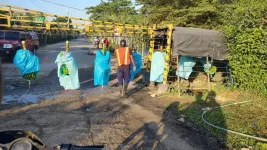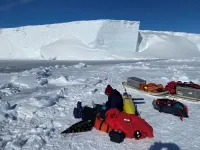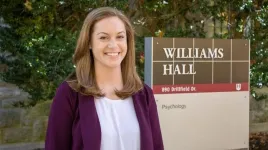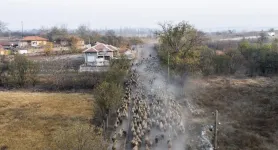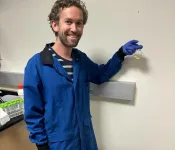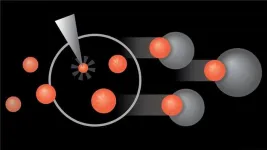(Press-News.org) LOGAN, UTAH, USA – Any boomer, gen xer, millennial, gen zer or alpha who’s studied geology has likely gained foundational knowledge from Edwin Dinwiddie McKee’s landmark studies of the Grand Canyon’s sedimentary record – even if they don’t readily recognize McKee’s name.
The legendary scientist, who lived from 1906-1984, studied and documented the stratigraphy and sedimentation of Colorado Plateau geology, especially the Grand Canyon’s Cambrian Tonto Group, for more than 50 years. His time-tested tenets have influenced generations of geoscientists.
“The Tonto Group holds a treasure trove of sedimentary layers and fossils chronicling the Cambrian Explosion some 540 million years ago, when the first vertebrates and animals with hard shells rapidly proliferated and sea levels rose to envelope continents with emerging marine life,” says Carol Dehler, professor at Utah State University. “McKee marveled at this pivotal geologic period, yet had no knowledge of plate tectonics or global sea level change, and his ideas were often shunned by the scientific community of the time.”
Yet, what if McKee could have fast-forwarded through time and availed himself of current-day stratigraphic, depositional and paleontological models, data and technological muscle?
Dehler, with colleagues James Hagadorn of the Denver Museum of Nature & Science, Frederick Sundberg, Karl Karlstrom and Laura Crossey of the University of New Mexico, Mark Schmitz of Boise State University and Stephen Rowland of the University of Nevada, Las Vegas, along with their students and interns, have employed these tools to construct an updated and insightful framework of McKee’s foundational ideas. They report their efforts in “The Cambrian of the Grand Canyon: Refinement of a Classic Stratigraphic Model,” the cover story of the November 2024 print issue of the Geological Society of America’s GSA Today journal, published online Oct. 23, 2024.
The team’s research was supported by a National Science Foundation Division of Earth Sciences grant.
“The Grand Canyon is an epic Rosetta Stone for geology,” says Hagadorn, Tim & Kathryn Ryan Curator of Geology at DMNS. “And we’re helping to further decode it. Because Grand Canyon rocks record global changes in climate and tectonics, our work help us understand strata that were deposited worldwide during the Cambrian period.”
Studying the Tonto Group, he says, is like being a detective at a crime scene.
“You can see clues and discern at least part of what happened,” Hagadorn says. “But determining how it happened and the sequence of events takes time and effort. Just like the scene of a crime, the rock record of the Grand Canyon is much more complicated than what we currently know and its story is still being written.”
Dehler says the team’s new model offers three key pathways for deeper understanding.
“From the Tonto Group’s 500-meter-thick strata, we’re learning about sea-level rise and the effects of catastrophic tropical storms – probably more powerful than today’s devastating hurricanes – during a period of very hot temperatures when the Earth was ice-free,” she says.
Sea levels were so high during this time period, Dehler says, that rocks like the Tonto Group were deposited atop every continent on Earth, as seas bathed the continents in a complex mosaic of shallow marine, coastal and terrestrial environments.
Further, she says, advanced chronological tools are revealing new information about the tempo of sedimentation, as well as how rapidly trilobites and other “disgusting, cockroach-looking creatures” diversified.
“Our findings are a reminder science is a process,” Hagadorn says. “Our work in the Grand Canyon, one of the world’s most well-known and beloved landscapes, connects people to this science in a very personal way.”
###
END
A Michigan State University researcher’s new model for studying breast cancer could help scientists better understand why and where cancer metastasizes.
Professor https://directory.natsci.msu.edu/Directory/Profiles/Person/103559 who teaches in the MSU Department of Physiology, has been researching the E2F5 gene, of which little is known, and its role in the development of breast cancer. Based on findings from Andrechek’s lab, the loss of E2F5 results in altered regulation of Cyclin D1, a protein linked to metastatic breast tumors after long ...
AUSTIN, Texas — Friends and distinguished alumni of the McCombs School of Business at The University of Texas at Austin inducted four alumni into the school’s Hall of Fame on Nov. 7 at the AT&T Hotel and Conference Center. This year’s honorees are Christopher Bake, BBA ’88; Ray Brimble, B.A. ’74; Bennett Glazer, BBA ’68; and Brien Smith, BBA ’79, MPA '81. McCombs Dean Lillian Mills also recognized 2024 Rising Stars Simeon Bochev, MSF ’13; Michael Ginnings, BBA ’09; and Gerardo Guardado, MBA ’10.
The ...
There’s no cure for a fungal disease that could potentially wipe out much of global banana production. Widespread adoption of cement paths, disinfection stations, and production strategies could net 3-4 USD of benefits for each dollar invested in Colombia.
Hundreds of millions of dollars in banana exports from Colombia are at risk due to a fungal disease best known as Tropical Race 4 (TR4). First detected in Asia in the 1990s, the Fusarium fungus that causes the disease arrived in Colombia in 2019, completing its inevitable global spread to South America, the last major banana production continent that remained TR4-free. Researchers are confident ...
New research reveals for the first time how a major Antarctic ice shelf has been subjected to increased melting by warming ocean waters over the last four decades.
Scientists from the University of East Anglia (UEA) say the study - the result of their autonomous Seaglider getting accidentally stuck underneath the Ross Ice Shelf - suggests this will likely only increase further as climate change drives continued ocean warming.
The glider, named Marlin, was deployed in December 2022 into the Ross Sea from the edge of the sea ice. Carrying a range of sensors to collect data on ocean processes that are important for climate, it was programmed to travel northward into ...
Navigating the intersection of alcohol use and intimate partner violence amongst young couples is not an easy journey, and for bisexual+ couples, the road may be even more winding.
“No study has examined the extent to which alcohol use increases intimate personal violence among bisexual+ young adults or daily experiences unique to them. Our study will look at factors such as minority stressors that may lead to alcohol-related partner violence,” said Meagan Brem, director of the Research for Alcohol and Couple’s Health Lab at Virginia Tech.
Alcohol use and intimate partner violence - defined as any action in a ...
A Branco Weiss Fellowship – Society in Science has been awarded to Dr Gergana Daskalova. The fellowship funds Daskalova’s research project “Biodiversity change amidst disappearing human traditions and changing socio-economics”. She joins the Department of Conservation Biology at the University of Göttingen to work together with Professor Johannes Kamp. The five-year fellowship, which is worth over €530,000, will enable Daskalova to investigate the ecological and human fingerprints of land abandonment. Considering the question from both a local and a global perspective, Daskalova’s research will reveal what happens to nature when people leave, ...
Junior Professor Johannes Walker, University of Göttingen, has been awarded an Exploration Grant from the Boehringer Ingelheim Foundation. Walker teaches and carries out research at the Institute for Organic and Biomolecular Chemistry. The award of 180,000 euros will enable Walker and his team to develop new approaches to synthesizing new compounds.
“The aim of our project is to develop new strategies for the synthesis of a particular group of new chemical compounds,’ Walker explains. These compounds are called saturated polycyclic molecules. They are structurally complex ...
A new EU joint research project led by the University of Göttingen will explore how migration, demographic change and current crises are affecting social cohesion and democratic structures in Europe. A key objective is to find out how resilient democratic structures can strengthen local communities in times of profound demographic change. The project “Identities - Migration - Democracy (We-ID)” has been awarded funding of around three million euros over three years by the European Union.
European societies are undergoing a profound demographic transformation: falling birth rates, rising life expectancy and migration are increasingly ...
UC Santa Cruz chemists have discovered a new way to produce biodiesel from waste oil that both simplifies the process and requires relatively mild heat. This discovery has the potential to make the alternative fuel source much more appealing to the massive industrial sectors that are the backbone of the nation’s economy.
In 2022, the U.S. transportation sector alone used about 3 million barrels of diesel per day, accounting for about 75% of total consumption of the fuel in this country. That same year, ...
HOUSTON ― The University of Texas MD Anderson Cancer Center today announced the launch of its Institute for Cell Therapy Discovery & Innovation, which will build upon longstanding MD Anderson clinical and research expertise to lead the world in developing and advancing impactful cell therapies for patients in need.
The institute will bring together top scientists and clinicians to lead exceptional discovery, translational and clinical research that will deliver new insights in immunology and cell engineering, fueling the creation of transformational new treatments that can be rapidly adapted to address emerging needs in cancer, autoimmune diseases, infections ...
